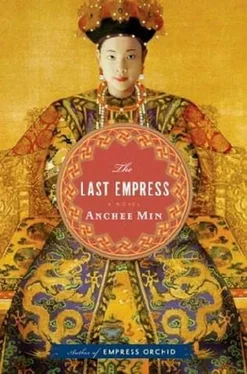The Emperor stopped. He turned to me and gave back the draft. His eyes filled with sorrow.
I continued. "The throne has made every effort to avoid war. We have issued edicts enjoining protection of legations and pity toward converts. We declared Boxers and converts to be equally the children of the state. It is the Western powers who forced us into this war."
The minister of foreign affairs, I-kuang, was sent to give the legations' residents twenty-four-hour notice to leave Peking, under the protection of Yung Lu's troops. The foreign affairs office in Tientsin and Sir Robert Hart's Chinese customs service were ordered to receive the residents and make arrangements to escort them to safety.
But the legations refused to abandon their rightful places in China. The Times 's George Morrison told legation residents, "If you leave Peking tomorrow, the death of every man, woman and child in this huge unprotected convoy will be on your heads. Your names will go down in history and be known forever as the wickedest, weakest and most pusillanimous cowards who have ever lived!"
On June 20, a German minister, Baron von Ketteler, was murdered.
Klemens August von Ketteler was a man of strong views and had a flaming temper, according to those who knew him. Only a few days before his death, he beat a ten-year-old Chinese boy with his lead-weighted walking stick until he was unconscious. The beating took place outside the German legation in full view of witnesses. Ketteler had suspected that the boy was a Boxer. After the beating, the boy was dragged into the legation. By the time the boy's family was informed and went to retrieve him, the boy was dead. The incident infuriated thousands of Chinese, who soon gathered outside the legation looking for revenge.
I never understood why Ketteler chose to set off in his palanquin at that particular moment, knowing the danger. He and his interpreter were heading toward the Board of Foreign Affairs. Ketteler had told his house staff that he had waited long enough for China's response to the ultimatum and intended to check on the progress himself.
A crowd of Boxers spotted Ketteler while he jolted toward the Foreign Affairs building. Within moments Ketteler was shot dead at pointblank range. His interpreter was wounded in both legs but was able to drag himself back to the German legation.
The murder of the German minister marked the beginning of what future historians would call the Siege of the Legations. Amid the mounting violence, the various legations united, and daily their guards fired their rifles, indiscriminately killing innumerable Chinese. Four times the legations' security guards attacked the East Gate of the Forbidden City, but were repulsed by General Tung's troops. Armed legation residents occupied the perimeter walls, which made it harder for Yung Lu's forces to maintain a defensive stance and carry out his mission-to prevent the Boxers from succeeding with the siege.
It was midnight when I woke to the burning of the Imperial front gate. The fire had been set by the Boxers as a result of a confrontation with Yung Lu's troops, which had been blocking the three "ring" assaults on the legations.
Next, the vast triple-tiered gateway to central Peking blazed in the darkness, engulfing in its flames the richest quarter of Peking. The Boxers had meant to burn only the shops that sold foreign goods, but in that dust-dry season, everything had been consumed.
I ordered the palace kitchen to make mounds of dumplings, for I had a procession of ministers, officials and generals tramping in and out at all hours. Dining etiquette was abandoned. Most of the men hadn't sat down for a meal in days. There was no place for plates-my table was covered with maps, messages, drafts and telegrams.
Now the foreign press, too, went on the attack. The world had be gun calling the siege "the Peking Massacre." The papers howled, "The Dowager Empress wanted the barbarians dead. All of them." So-called anonymous sources had me "directing the murderers" myself.
"We have been out of touch with the world's reactions since the telegraph wires came down. The repairs are taking too long," I-kuang complained.
Understanding that the accusations would provide ample excuse to declare war on China, I became extremely nervous. I kept looking at Yung Lu, who sat across from I-kuang.
"How is Emperor Guang-hsu?" I-kuang asked. "He's been absent from the audiences."
"Guang-hsu hasn't been feeling well," I replied.
"Are his wives with him?"
I found the question odd, but decided to answer anyway. "Empress Lan and the concubines visit His Majesty daily, although my son prefers to be alone."
I-kuang gave me a quizzical look.
"Is there something wrong?" I asked.
"No, but the foreigners have been inquiring after the throne's health. Apparently my answers are no longer satisfactory to them. They suspect that His Majesty has been tortured and left to die." I-kuang paused, then added, "The rumor has appeared in papers around the world."
"Go and see with your own eyes!" I became enraged. "Pay His Majesty a visit at Ying-t'ai!"
"The foreign journalists have requested face-to-face interviews…"
"We will not allow foreign journalists inside the Forbidden City," Yung Lu put in. "They will pick the bones out of an egg no matter what we do."
"It's getting personal," I-kuang said, handing me a copy of the London Daily Mail.
"The legations stood together as the sun rose fully," one "eyewitness" told a reporter. "The little remaining band, all Europeans, met death stubbornly, and finally, overcome by overwhelming odds, every one of the Europeans remaining was put to the sword in the most atrocious manner."
Later, the London Times would publish a special report on a memorial service held at St. Paul's Cathedral for the British legation's "victims." Pages of death notices would be printed. Sir Claude MacDonald -the husband of Lady MacDonald-Sir Robert Hart and the Times's own devoted correspondent George Morrison all lived to read their own obituaries.
On June 23, General Tung's troops surrounded the three-acre compound of the British legation. His Moslem force tried to break through the north wall, where stood China's elite Hanlin Academy. When all other efforts failed, Tung ordered his soldiers to toss lighted firebrands into the academy, intending to smoke the foreigners out. A strong wind whipped up the flames, which consumed the oldest library in the world.
Yung Lu watched the Boxers hurl themselves futilely against the legation barricades. No one was aware that Yung Lu, at the age of sixty-five, had fallen ill. He had been hiding his condition from me, and I was too preoccupied to notice. I treated him as if he were made of iron. I did not know that he had only three more years to live.
Convinced that a massacre at the legations would bring retribution from the Western powers, Yung Lu refused General Tung's demand for more powerful weapons. Yung Lu controlled the only battery of heavy artillery.
I wondered how Western journalists and their "eyewitnesses" could miss the fact that since the siege began, fewer assaults were made from those sectors held by Yung Lu's troops. It was a known fact that not long before, China had purchased advanced weapons through its diplomatic connections-Robert Hart among others. If those weapons had been used against the legations, their so-called defense, which involved around a hundred men, would have been reduced to rubble within hours.
On behalf of the Emperor of China, I-kuang held a conference to declare a cease-fire. To the throne's shame, it meant nothing to the legations or the Boxers. The fighting continued.
General Tung and his Moslem troops changed their strategy: they moved to cut off the legations' supply line. From the Chinese servants who had run away from the legations, we learned that all were short of water and food. The shortage grew critical as the fighting intensified. And besides the wounded, the legations had their share of sick women and children.
Читать дальше












